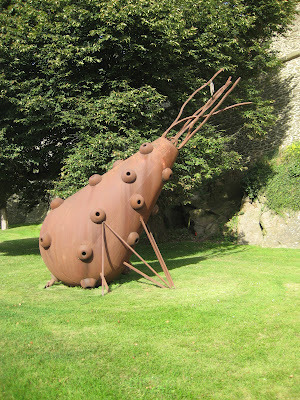Mapping the Post-human

For a few days in the first week of September I was in the Breton port city of Brest (which although medieval is an architectural riot of modernity, nearly every building except its impregnable chateau having been levelled in 1944) at an academic colloquium on Mapping Humanity and the Post-human to which I'd been invited by its organiser, the erudite and vivacious Hélène Machinal. Its programme was wide-ranging, and mostly in French. Although I couldn't follow everything that was said, I think I got the gist of most, and was kindly helped by a student who volunteered to sit beside me and pass notes.
I found it strange to be listening in to serious academic discussion of ideas that originated on the fringes of science fiction, and to hear 'Kurzweil', 'Vinge' and 'extropians' pop up from a flow of French discourse like yellow plastic ducks on the Seine. About half the discussion was on the post-human in mainstream literature and philosophy, but popular culture, movies, and SF were just as minutely and seriously anatomised.
My own presentation touched on my earliest encounter with extropianism and (that cheap laugh out of the way) argued that Darwin had made post-humanism possible: first, by establishing that humanity was a species with predecessors and (by implication) possible successors, and (therefore) that the human mind was the outcome of a material process; and secondly, by shifting the notion of 'species' from an essence to a population, with no intrinsic limit of variation. Once 'the human' ceases to be an essence, it loses its self-evident status as a standard of value. Watson and Crick followed up in 1953 by demonstrating the material basis of heredity, and hence the possibility of consciously changing it.
Two developments that were new in the 1980s and 1990s made post-humanism a project rather than a prophecy. The first was that thanks to Moore's Law and molecular biology, it became possible for the first time for people to imagine that they themselves might live into the post-human era. The second was that socialism, the global project whereby the International was to unite the human race, was over, and with it the counter-project of liberal humanism. Humanity is no longer an imagined community. If it's ever to become so again, something like the socialist project will have to be revived, or replaced by a different project with less hubris but no less ambition.
Otherwise the robots will rise up and eat our brains, if we haven't beaten them to it by bashing each other's heads in first.

Published on September 16, 2012 06:06
No comments have been added yet.
Ken MacLeod's Blog
- Ken MacLeod's profile
- 762 followers
Ken MacLeod isn't a Goodreads Author
(yet),
but they
do have a blog,
so here are some recent posts imported from
their feed.



